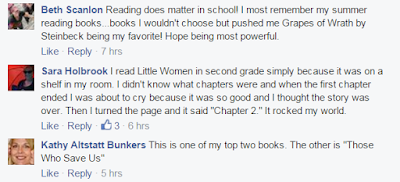Reading matters. People who read have more opportunities than people who do not.
Kelly Gallagher brilliantly captures the many ways reading benefits citizens and societies in Reading Reasons, a collection of mini-lessons you can use with kids. Gallagher's lessons are great for answering kids' questions about the value of reading. His lessons take aim at the "why are we doing this?" questions that kids sometimes use to delay a lesson or disengage.
Kids aren't the only people who may question the value of using class time to read. Colleagues, parents, even, administrators may question the value of spending class time reading. Use those challenges as an opportunity to reach out and teach. View those challenges as an opportunity to illuminate. Shine the light of stories, books and their power to change people into the darkness of fixed mindsets.
Yesterday I did just that by asking former students and friends to share stories of books that changed them.
Books change readers. So many former students, friends and educational colleagues reaffirm that. Book resonate across areas of our lives. Christine, former middle-school teacher and current amazing gardener, is moved by Walden. John Green's The Fault in Our Stars changed her student, Amanda. Rhonda, friend and youth leader at St. Luke's Lutheran Church was changed by Anne Voskamp's One Thousand Gifts.
Educators from the Northeast (Sarah Gross, Kim McCollum-Clark, Nelson Alvarez and Penny Kittle) were changed by books they read as kids and continue to grow and change from the stories they read and share as adults. Midwestern and southern teachers too--Gary Anderson, Lee Corey, and Beth Scanlon, and Kathleen Richardville--have been shaped by books.
Books cross borders (into British Columbia, Meredyth Kezar). Books change readers in Iowa and in Washington State.
Books break down barriers (Navid Akbar) and connect us to one another. If you have fallen in love with a book, like Penny Kittle, author of Book Love, has then you will fight for the right to read.
Books change kids. Books change adults. Books change teachers, friends, even friends of friends. Book change church workers, students,engineers, writers and even poets (Sara Holbrook). If you can find yourself and others in story there is hope for our world.
The next time someone challenges the value of reading in your classroom, ask them about a book that changed them. Listen. Tell them about the book that changed you. Then, fight for your students' right to read.
Reading matters.
If you want to dig into the research that supports independent reading, read or revisit this post from last year, "Life Demands Reading"






































